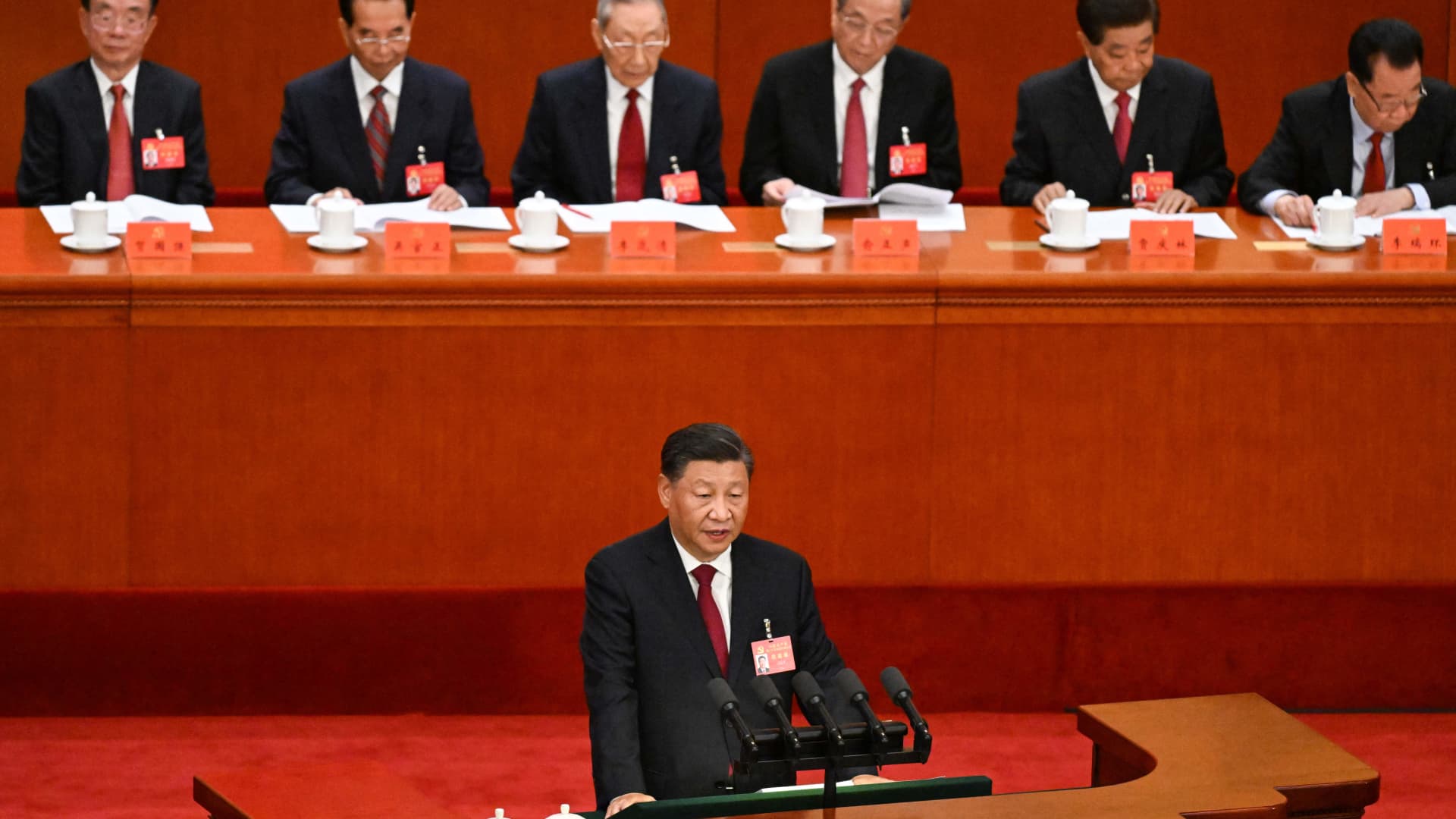BEIJING — Chinese President Xi Jinping affirmed Sunday the country’s recent shift away from rapid growth and greater focus on national self-sufficiency, especially in technology.
Xi was speaking at the opening ceremony of the ruling Communist Party of China’s 20th National Congress, held once every five years. His same speech in 2017 had begun with much discussion of China’s economic growth.
In contrast, Xi on Sunday began his remarks with greater emphasis on China’s “national rejuvenation” and opposition to Taiwan independence.
Xi briefly mentioned in that opening section how the country’s Covid policy has achieved “positive results” in coordination with economic development. He did not state whether the policy would end or continue.
China’s Covid controls helped the country quickly return to growth in 2020. But the controversial “zero-Covid” policy has become increasingly stringent this year, prompting investment banks to repeatedly slash growth estimates for China.
Looking ahead, Xi emphasized the country needed a solid technological foundation in order to achieve its modernization goals. Some areas he mentioned included boosting the quality of China’s manufactured products, the country’s capabilities in space transportation and digital development.
“Without solid material and technological foundations we cannot hope to build a great modern socialist country,” Xi said in Chinese, according to an official English translation.
Since the party’s 19th National Congress, the U.S. has increased its pressure on China. The Biden administration has called China a strategic competitor and this month announced new export controls on semiconductors — in an effort to maintain a U.S. edge in tech over China.
Xi did not mention specific countries in his nearly two-hour-long speech.
However, he dedicated one section to stating how the country would emphasize education for developing its own talent in science, and accelerate the launch of national projects with “strategic” and “long-term importance.” He did not provide further details.
He also did not leave out growth plans altogether. Xi said the country would aim to boost productivity, make its supply chains more resilient and expand overall economic output.
‘High-quality development’
The speech in general laid out a framework for Xi’s near-term plan for China, which he said is to “basically realize socialist modernization” between the years 2020 and 2035.
He cast prior success — in building the world’s second-largest economy and becoming a “major destination for global investment” — as achievements already in the books.
The Chinese Communist Party has already announced 100-year development goals — to “build a moderately prosperous society in all respects” by 2021 and “build a modern socialist country that is prosperous, strong, democratic, culturally advanced and harmonious” by 2049.
Xi’s list of “essential requirements” for Chinese modernization began with upholding the leadership of the Communist Party of China, followed by “high-quality development.”
The list included achieving common prosperity — moderate wealth for all rather than just a few — and “harmony between humanity and nature.”
China’s Xi previously announced plans to reach peak carbon emissions by 2030, and carbon neutrality in 2060.
Analysts have attributed China’s renewed emphasis on common prosperity last year to a crackdown on internet tech companies and after-school education businesses. Those measures, on top of China’s Covid controls, have made foreign investors increasingly cautious about the potential growth opportunities in the country.
On Sunday, Xi spoke of promoting a “healthy” online environment. He said the country would encourage getting rich through hard work and expand its middle class. He indicated China would standardize an unspecified mechanism for wealth accumulation.
He did not specifically address China’s ongoing troubles in real estate, but repeated prior statements about speeding up measures to encourage both house purchases and rentals.
Xi warned of “dangerous storms” on the journey ahead, and called for commitment to the party’s leadership, “reform and opening up” and other principles.
After leading the Chinese Communist Party and the country over the past decade, Xi is widely expected to further consolidate his power at the party’s 20th National Congress. Next weekend, the names of the new core team around Xi are due to be announced.
